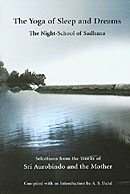Day and night are interconnected in Integral Yoga. The greater equanimity you maintain during the day, the more conscious you become in your dreams at night and conversely, the better you sleep, the more self-aware you are able to become during the day. While this is true in principle, it is quite difficult to put into practice during waking hours. Engrossed in quotidian social activities, we may find it demanding to monitor every thought, emotion or velleity which bubbles up and gets suppressed from moment to moment. We barely notice the passing flicker of pride, the soupçon of jealousy, the concealed embarrassment or the shrinking revulsion that our consciousness instinctively invests in every event or person. Unnoticed, this burden of cathectic bonds builds up day after day in our subconscious eventually turning us into sullen, predictable and listless creatures.
An exercise suggested by the Mother can help purge these tenebrous clouds which overshadow the inner light. Every night before going to sleep, one should sit in a comfortable contemplative posture and one by one, visualize the events of the day on the mental screen without thinking too much about them. Take each event and identify and gently release the emotions that got attached to it. Forgive, forget, and stand back from the daily play.
This is the Mother’s description of the exercise:
If in your mind you go over the various movements and reactions of the day like one repeating indefinitely the same thing, you will not progress. If this reviewing is to make you progress, you must find something within you in whose light you yourself can be your own judge, something which represents for you the best part of yourself, which has some light, some goodwill and which precisely is in love with progress. Place that before you and, first of all, pass across it as at a cinema all that you have done, all that you have felt, your impulses, your thoughts, etc.; then try to coordinate them, that is, find out why this has followed that. And look at the luminous screen that is before you: certain things pass across it well, without throwing a shadow; others, on the contrary, throw a little shadow; others yet cast a shadow altogether black and disagreeable. You must do this very sincerely, as though you were playing a game: under such circumstances I did such and such a thing, feeling like this and thinking in this way; I have before me my ideal of knowledge and self-mastery, well, was this act in keeping with my ideal or not? If it was, it would not leave any shadow on the screen, which would remain transparent, and one would not have to worry about it. If it is not in conformity, it casts a shadow. Why has it left this shadow? What was there in this act that was contrary to the will to self-knowledge and self-mastery? Most often you will find that it corresponds to unconsciousness—then you file it among unconscious things and resolve that next time you will try to be conscious before doing anything. But in other cases you will see that it was a nasty little egoism, quite black, which had come to distort your action or your thought. Then you place this egoism before your “light” and ask yourself: “Why has it the right to make me act like that, think like that?…” And instead of accepting any odd explanation you must search and you will find in a corner of your being something which thinks and says, “Ah, no, I shall accept everything but that.” You will see that it is a petty vanity, a movement of self-love, an egoistic feeling hidden somewhere, a hundred things. Then you take a good look at these things in the light of your ideal: “Is cherishing this movement in conformity with my seeking and the realisation of my ideal or not? I put this little dark corner in front of the light until the light enters into it and it disappears.” Then the comedy is over. But the comedy of your whole day is not finished yet, you know, for there are many things which have to pass thus before the light. But if you continue this game—for truly it is a game, if you do this sincerely—I assure you that in six months you will not recognise yourself, you will say to yourself, “What? I was like that! It is impossible!”
You may be five years old or twenty, fifty or sixty and yet transform yourself in this way by putting everything before this inner light. You will see that the elements which do not conform with your ideal are not generally elements which you have to throw wholly out of yourself (there are very few of this kind); they are simply things not in their place. If you organise everything— your feelings, your thoughts, your impulses, etc.— around the psychic centre which is the inner light, you will see that all inner disorder will change into a luminous order.
(Collected Works of the Mother, vol. 4, pp 38-40)
Plunging her deep regard into herself
In her soul’s privacy in the silent Night.
Aloof and standing back detached and calm,
A witness of the drama of herself,
A student of her own interior scene,
She watched the passion and the toil of life
And heard in the crowded thoroughfares of mind
The unceasing tread and passage of her thoughts.
All she allowed to rise that chose to stir;
Calling, compelling nought, forbidding nought,
She left all to the process formed in Time
And the free initiative of Nature’s will.
(Sri Aurobindo. Savitri, Book VII, Canto VI)
Further Reading
Sri Aurobindo and the Mother’s advice on sleep and dreams is available in a few books published by SABDA. Click on the image below to go the catalog entry.
Related Posts
- Subtle forms of the ego – (transcending suffocation)
- Walking with eyes unfocused
- Towards more conscious sleep and dreaming.
- Stabilizing the body before meditation
- The equipoise required for Yoga
- The psychic joy derived from a selfless act
- Dharana Shakti : the capacity to sustain spiritual experiences
- Widen the consciousness
- How to eat like a Yogi
- Self-control over speech
- Gorakhnath’s enumeration of contemplation methods
- Distinguishing between stilling the mind and dynamizing meditation
- Cultivating witness consciousness (Saksi Bhava)
- Sublimation of the sexual urge through Yoga
- Surmounting the unpleasant images and negative thoughts which occur during meditation




Reblogged this on The Mother's Lasso.
Pingback: Reading and writing books in a dream | Integral Yoga of Sri Aurobindo & The Mother
Pingback: Sleep-learning and the Upanishads | Integral Yoga of Sri Aurobindo & The Mother
Pingback: Anecdotes of my Guru | Integral Yoga of Sri Aurobindo & The Mother
Pingback: Sandeep Joshi | The Mother's Lasso